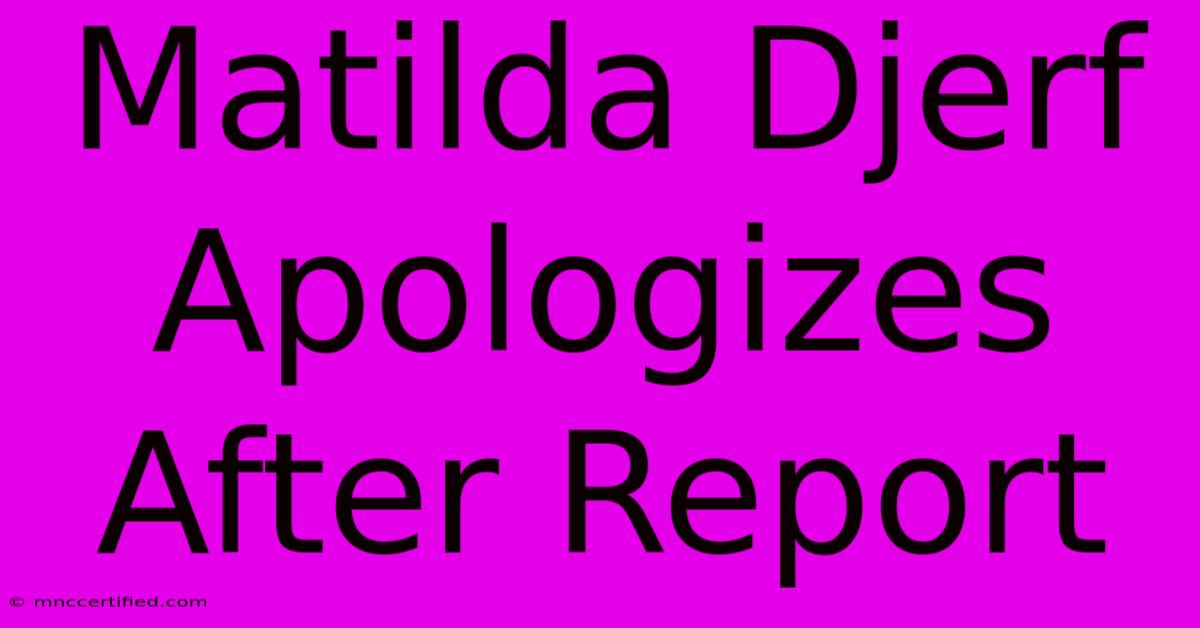Matilda Djerf Apologizes After Report

Table of Contents
Matilda Djerf Apologizes After Report: A Deep Dive into the Controversy
Matilda Djerf, the hugely popular Swedish influencer and entrepreneur, recently found herself at the center of controversy, leading to a public apology. This article delves into the details of the report that sparked the backlash, Djerf's response, and the broader implications for influencers and their brands. Understanding this situation provides valuable insight into the responsibilities and potential pitfalls of online influence.
The Report and the Backlash: What Happened?
The controversy surrounding Matilda Djerf erupted following a report – [insert source of the report and a brief, neutral summary here. For example: a report in Aftonbladet alleging unethical labor practices at her company, Matilda Djerf's clothing brand]. The specifics of the report are crucial, and including them directly here is vital for providing context. Mention specific accusations clearly but without bias. (e.g., "The report alleged underpayment of employees," or "Concerns were raised about working conditions in the factory supplying the brand").
This report ignited a firestorm of criticism on social media. Many followers expressed disappointment and anger, questioning Djerf's brand ethics and previously perceived image of transparency and authenticity. The hashtag #MatildaDjerf became a trending topic, with many users sharing their opinions and experiences. This section should focus on the public reaction, highlighting the scale and intensity of the backlash.
Analyzing the Public Reaction: Key Themes and Trends
The public response wasn't monolithic. Several key themes emerged from the online discussion. These included:
- Concerns about labor exploitation: Many commentators focused on the alleged unethical treatment of workers, highlighting the ethical responsibilities of influencers and brands.
- Damage to brand reputation: The impact on Djerf's brand image was widely discussed, with some suggesting long-term consequences for her business.
- The role of social media in accountability: The incident served as a reminder of the power of social media in holding influencers accountable for their actions and the practices of their businesses.
- Call for transparency and ethical practices: Many called for greater transparency and ethical standards within the influencer industry.
Matilda Djerf's Apology: A Measured Response?
Following the intense backlash, Matilda Djerf issued a public apology [insert link to the apology if available]. Analyzing the apology is critical for evaluating its effectiveness. Did she directly address the specific accusations? Did she take responsibility? Did the apology feel genuine and heartfelt? Consider these questions while summarizing the content of her apology.
Analyzing the Apology's Effectiveness
The success of Djerf's apology depends on several factors, including:
- Sincerity and ownership: A genuine expression of remorse and taking responsibility for the situation is crucial.
- Specificity: Addressing the specific allegations directly and providing concrete steps for improvement is essential.
- Transparency: Open communication and a commitment to transparency going forward can rebuild trust.
- Actionable steps: Outlining clear, actionable steps to prevent similar incidents in the future demonstrates commitment to change.
The Broader Implications for Influencers and Brands
The Matilda Djerf controversy serves as a cautionary tale for other influencers and businesses. It highlights the importance of:
- Ethical sourcing and manufacturing: Brands must prioritize ethical and sustainable practices throughout their supply chains.
- Transparency and accountability: Open communication with followers and taking responsibility for actions is critical for maintaining trust.
- Due diligence: Thorough research and vetting of suppliers are necessary to ensure ethical standards are upheld.
- Risk management: Developing effective risk management strategies can help mitigate potential crises.
This situation underscores the growing demand for ethical and responsible behavior within the influencer industry. Consumers are increasingly discerning and demanding accountability from the brands and personalities they support.
Conclusion: Learning from the Controversy
The Matilda Djerf controversy offers valuable lessons for both influencers and consumers. For influencers, it highlights the crucial importance of ethical conduct and transparent business practices. For consumers, it serves as a reminder to critically evaluate the brands and personalities they support and to demand accountability for ethical lapses. The long-term consequences of this event remain to be seen, but it's undoubtedly a significant moment in the ongoing evolution of the influencer landscape. The situation also demonstrates the growing power of social media in shaping public opinion and holding influential figures accountable.

Thank you for visiting our website wich cover about Matilda Djerf Apologizes After Report. We hope the information provided has been useful to you. Feel free to contact us if you have any questions or need further assistance. See you next time and dont miss to bookmark.
Featured Posts
-
Nunez Elliott Secure Liverpools 2 1 Victory
Dec 19, 2024
-
Trinity Rodman On Dennis Rodman Not A Dad
Dec 19, 2024
-
Scotlands First Body Double Jailed
Dec 19, 2024
-
Channel 4 Loses Simpsons 2024 Update
Dec 19, 2024
-
Bank Of England Pauses Rates Inflation Up
Dec 19, 2024